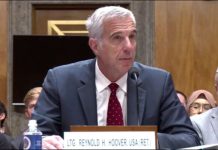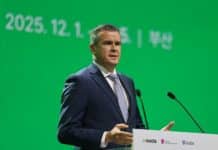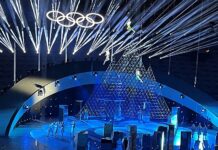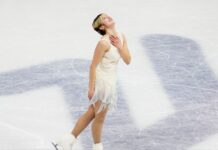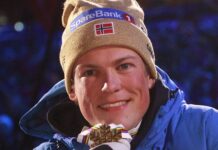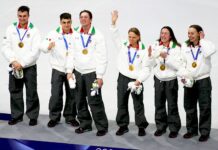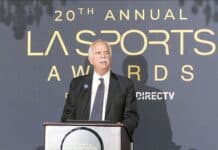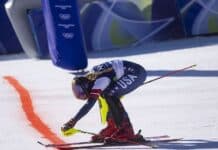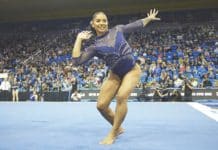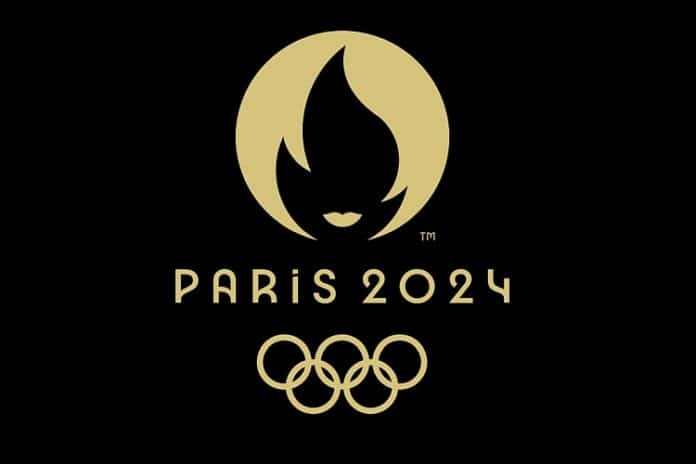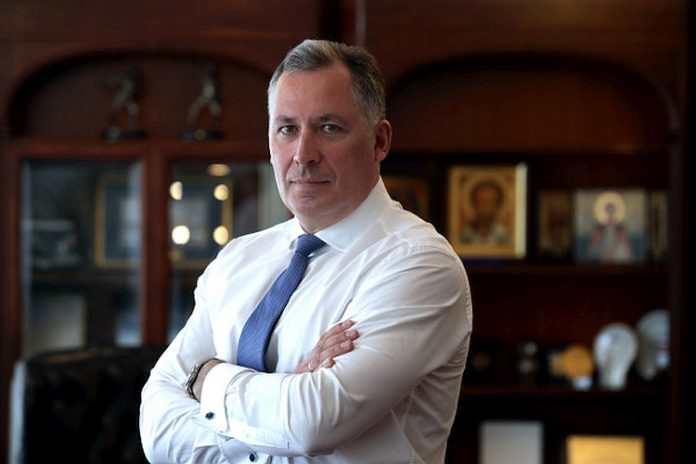★ The Sports Examiner: Chronicling the key competitive, economic and political forces shaping elite sport and the Olympic Movement.★
★ To get The Sports Examiner by e-mail: sign up here! ★
≡ THE 5-RING CIRCUS ≡
1. LANE ONE: IOC leads $45 million refugee aid pledge; what about Olympic athletes?
2. Putin says IOC’s Olympic restrictions must be analyzed
3. Takahashi pleads not guilty to Tokyo 2020 bribery charges
4. U.S.’s Bennett surprises with Val Gardena Downhill win!
5. Hibbert and Alfred win Bowerman Awards for 2023
● The International Olympic Committee announced a $45 million “Joint Sport Pledge” at the Global Refugee Forum in Switzerland, leading an investment in sport for refugees. But as the IOC reaches out to the grass roots, what about an investment in its most high-profile ambassadors: its Olympic athletes? Is it time for Olympic athletes to get some money for making it to the ultimate showcase?
● Russian President Vladimir Putin said during his year-end news conference that the IOC’s regulations for the participation of Russian athletes must be analyzed carefully, and that if the top Russian athletes cannot compete, then the Russian Olympic Committee and sports ministry “need to assess the situation and make a balanced decision.”
● Former Tokyo 2020 Executive Committee member Haruyuki Takahashi pled not guilty to charges of receiving bribes from companies seeking to be Olympic sponsors or seeking work from sponsors.
● American Bryce Bennett raced to a stunning, upset victory in the Downhill in the FIS Alpine World Cup at Val Gardena in Italy. It’s Bennett’s second career World Cup medal; the other was another win at Val Gardena two years ago.
● At the annual Bowerman Awards, Arkansas freshman jumper Jaydon Hibbert of Jamaica and Texas sprint star Julien Alfred of St. Lucia were recognized as the top collegiate track & field athletes of the year.
● Panorama: Russia (WADA skeptical of Russian anti-doping program) = Athletics (four more doping bans announced) = Basketball (Williams named USA Basketball 3×3 women’s athlete of the year) = Cycling (no mechanical fraud in World Tour and Women’s World Tour tests) = Fencing (USA Fencing stalwart Cheris passes at 78) = Football (2: women allowed again in Tehran stadium; FIFA announces player of the year finalists) = Swimming (Grimes heads U.S. open-water team for Doha) = Weightlifting (Theisen Lappen wins at Grand Prix II) ● 9
● Update: Yesterday’s story on the U.S. Olympic & Paralympic Endowment Awards did not clarify that the awards luncheon was held on Wednesday (13th). Bruce Baumgartner (Gen. Douglas MacArthur Exemplary Service Award) and Dale Neuburger (George Steinbrenner III Sport Leadership Award) attended, but Mary Lou Retton (William E. Simon Award) had a family member present to receive her award as she is still recovering from her illness. The post has been updated. ●
1.
LANE ONE:
IOC leads $45 million refugee aid pledge;
what about Olympic athletes?
The International Olympic Committee made a grand, but also curious, gesture at the Global Refugee Forum held in Geneva (SUI) on Wednesday, offering a $45 million “Joint Sport Pledge’ to aid as many as 500,000 displaced persons.
According to the IOC’s statement, President Thomas Bach (GER) “presented the Joint Sport Pledge on behalf of more than 100 organisations, including over 40 National Olympic Committees and International Federations, as well as governments, refugee-led organisations, UN agencies, civil society organisations, private sector representatives and beyond.”
The statement also noted that the IOC is pledging $15 million to support refugee athletes and the third IOC Refugee Team that will appear in Paris next summer, promote refugee support through media outreach attached to the Olympic Games, use sport to promote mental health of child refugees and create helpful coalitions.
The $45 million commitment is not all in cash: “The commitments made as part of the pledge are as diverse as the pledging entities, and include financial, technical and material support, as well as policy commitments and those that create opportunities for resettlement and complementary pathways.”
But this is quite remarkable. The IOC’s Refugee Athlete Scholarship currently supports 62 athletes from 11 countries, who now live in 19 other countries as refugees. The IOC’s Olympic Solidarity program sponsored 1,146 Olympic Scholarships for Athletes – Paris 2024 in 2022, across 145 National Olympic Committees.
But the Joint Sport Pledge goes well beyond the support of elite and near-elite athletes to grass roots programs, which have mostly been the province of the National Olympic Committees and the International Federations, not so much the IOC. The Olympic Solidarity budget for the Paris 2024 cycle is now $590 million.
But with all of this support for those in need, what about the IOC’s biggest allies and leaders of its future: its Olympic athletes?
Yes, there are plenty of known superstars who will be in Paris and attract vast attention, from U.S. basketball players to Indian javelin throwers to French judoka and Australian swimmers. But as those involved in the Olympic Movement are well aware, most athletes struggle to get by and many are in sports with little commercial profile, such as canoeing, modern pentathlon, sailing and so on.
With the IOC taking in $7.6 billion in the 2017-20/21 cycle, and sitting on $3.62 billion in reserves at the end of 2022, the IOC is well positioned to make an investment in its future through the athletes who compete in the Olympic and Olympic Winter Games.
Why not pay Olympic athletes?
The cries for prize money make little sense for the IOC and are in conflict with the history of the Olympic Games, which, in ancient times, saw the city-states which sent athletes to the Games also reward them for success. This is still true today, with National Olympic Committees paying medal bonuses to athletes who reach the Olympic podium.
It was modern Olympic Movement founder Baron Pierre de Coubertin of France who referred a banquet audience during the 1908 London Games to a sermon he had heard days before in a church service:
“The Bishop of Pennsylvania recalled this in apt terms: ‘In these Olympiads, the important thing is not winning, but taking part.’ Gentlemen, let us remember this strong statement. It applies to every endeavor, and can even be taken as the basis of a serene and healthy philosophy. What counts in life is not the victory, but the struggle; the essential thing is not to conquer, but to fight well. To spread these precepts is to help create a more valiant, stronger humanity, one that is also more scrupulous and more generous.”
De Coubertin’s comment was formalized for the 1932 Olympic Games in Los Angeles and shown on the Los Angeles Memorial Coliseum scoreboard as:
“The important thing in the Olympic Games is not winning, but taking part – The essential thing is not conquering but fighting well. ~ De Coubertin”
It has become one of the iconic mottos in sports.
Adapted to today’s situation, an investment by the IOC in its athletes – all of its athletes, not just those who win medals – would be for an honorarium to all Olympians.
What would this cost? A lot, but actually manageable given the IOC’s revenues, for the roughly 14,000 athletes who compete in the Olympic (11,000) and Winter (3,000) Games:
● 14,000 x $1,000 = $14 million (U.S.)
● 14,000 x $2,000 = $28 million (U.S.)
● 14,000 x $3,000 = $42 million (U.S.)
● 14,000 x $4,000 = $56 million (U.S.)
● 14,000 x $5,000 = $70 million (U.S.)
● 14,000 x $7,500 = $105 million (U.S.)
● 14,000 x $10,000 = $140 million (U.S.)
For star North American and European athletes, this may not seem like a lot, but it could be life-changing for athletes in low-revenue sports and for those in countries with low wage standards. How much change could such gifts bring to those in developing countries?
If the IOC can spend money, time and resources on these exceptionally worthwhile refugee projects, does it not have the energy to distribute some of its wealth to those athletes who achieve the title of Olympian?
The IOC’s commendable work on the Joint Sport Pledge should be exceeded by its willingness to invest in the people it says it values most: its Olympic athletes.
Rich Perelman
Editor
2.
Putin says IOC’s Olympic restrictions must be analyzed
At his year-end news conference, Russian President Vladimir Putin gave no direct indication whether “neutral” Russian athletes will be able to participate in the 2024 Olympic Games in Paris, but introduced some doubt into the process:
“I’ve always said that athletes are training for years, and we must provide them with an opportunity to participate in grand tournaments, including the Olympic Games.
“Everyone knows that this is our flag flying, everyone knows that this is our athlete participating, it is obvious. That’s why I kept supporting the participation of our athletes in such competitions, but at the moment we need to thoroughly analyze conditions on behalf of the International Olympic Committee.
“If these artificial conditions seek to prevent our leaders, the athletes who are capable of winning gold, silver and bronze medals [from participating], exhaust our team and make it seem that Russian sports is dying instead of developing, then the Ministry of Sports and the Russian Olympic Committee need to assess the situation and make a balanced decision.”
He also reiterated his criticism of the IOC as having become a tool of its sponsors:
“Everything that international officials impose in regard to the Russian sports movement contradicts and perverts the original idea of Pierre de Coubertin … The Olympic Movement was established to unite people, not divide them.
“International officials have become too deeply involved in the business side of the sports movement today and they rely heavily on their donors. If things go on like this, they will bury the Olympic Movement.”
State Duma member and Turin 2006 Olympic speed skating gold medalist Svetlana Zhurova said the IOC’s tactics may be aimed at forcing Russians not to go to Paris:
“If now we ban athletes from participating, and after some time the IOC returns our athletes with the flag and anthem, what then? You need to be balanced, and conditions can change in different directions.
“There is still time before the Olympics, and the president does not want to be the politician who prohibits athletes from going to the Olympics. But the West is just waiting for this.”
Putin’s comments were also expanded on by four-time biathlon Olympic relay gold medalist Alexander Tikhonov, who suggested that only those athletes who are potential medal winners should go to Paris:
“Everything needs to be weighed and left to the professionals. The discussion should involve the heads of federations, the athletes themselves and representatives of the government or the president. We have time to make a decision.
“Many of our athletes have already lost their chances of qualifying for the Olympics, we will no longer be able to form a full delegation, and if we now send those who have no claims to medals, they will laugh at us. They will say that it was right that they did not allow us in, because we were of no use. But I wouldn’t go even if I was competing for a medal.”
3.
Takahashi pleads not guilty to Tokyo 2020 bribery charges
The man at the center of the Tokyo 2020 sponsorship selection scandal, former Dentsu senior director Haruyuki Takahashi, was in court on Thursday and unlike all of the other defendants in the case, did not plead guilty.
“I assert my innocence on all the charges. It was strictly business and it was not a bribe.”
Takahashi, 79, who was a member of the Tokyo 2020 Executive Committee and played a lead role in the procurement of a record-setting $3.3 billion in domestic sponsorship revenue, is accused of receiving payments totaling about ¥198 million (~$1.39 million U.S.) in payments from various companies trying to get sponsorship status or other work from Tokyo 2020.
Prosecutors say he received money from multiple companies between 2017-22, including:
● Aoki Holdings, a business suit retailer
● Kadokawa Corpation, publishers
● Sun Arrow, a maker of plush toys
● ADK Holdings, an advertising agency
● Daiko Advertising
Two other companies, Amuse Consulting and Common 2, may have been fronts through which Takahashi also received payments. In the case of Aoki Holdings and Kadokawa Corporation, the allegation is that the companies became sponsors at a discounted rate thanks to Takahashi; Sun Arrow received a license to make toys with Tokyo 2020 marks and of the mascots; the advertising agencies wanted help to be named as agents for other companies who were sponsors or suppliers.
Ten people have pled guilty to providing bribes, all of whom have received suspended sentences. The trial will extend into January.
This is a separate inquiry from the big-rigging scandal concerning test events and then venue management contracts, with criminal charges being pursued against several companies, including Dentsu. That trial is ongoing and will continue in 2024.
4.
U.S.’s Bennett surprises with Val Gardena Downhill win!
This wasn’t supposed to happen. The way that FIS Alpine World Cup races are structured, the medal winners almost always come from the first group of skiers, numbers 1-15. After they race, there is a break and then skiers 16-22 go, then 23-30 and, finally, nos. 31 to the end.
After the first three Downhill races of the men’s World Cup season were canceled due to bad weather, Thursday’s race at Val Gardena (ITA) turned out to be a shocker. After the top 15, Norwegian star Aleksander Aamodt Kilde, a 12-time World Cup downhill winner and the 2023 Worlds runner-up, was a happy 0.02 seconds up on reigning World Cup champion Marco Odermatt of Switzerland, 1:23.83 to 1:23.85.
France’s Nils Allegre, starting 25th, scared the leaders with a 1:23.93 finish and was in third place, in position to win his first World Cup medal.
Then came American Bryce Bennett, starting 34th, who had won one career World Cup medal, a gold in the Downhill at Val Gardena in December 2021. And lightning struck again.
Bennett, 31, zipped down this hill that he knew well, accelerated where it would do the most good and crossed in a stunning 1:23.80, to take his second career win and second career World Cup medal.
“I did not expect the green light! I wanted to put down a run that I was going to be proud of and I left everything on the hill. I knew I had to take risk in two spots, but there is the chance to lose speed. And if you lose speed here, you’ll never get it back.
“I’m super excited to start the season like this – first downhill of the season!”
Beyond his two wins in Val Gardena, Bennett has four other top-five finishes, all in Downhills and four of his six top-fives have been at this race. There is a Super-G on Friday and then another Downhill on Saturday, with the chance for another shocker.
Bennett’s victory was the first for a U.S. man on the World Cup circuit since his 2021 win, and beyond that, since December 2020 when Ryan Cochran-Siegle won a Super-G at Bormio (ITA).
5.
Hibbert and Alfred win Bowerman Awards for 2023
The U.S. Track & Field and Cross Country Coaches Association announced the winners of the annual Bowerman Awards on Thursday, given to the top collegiate track & field stars of the season.
The ceremony, held during the USTFCCCA Convention at the Gaylord Rockies Resort in Aurora, Colorado, started on a fun note as 2019 winner – and World 110 m hurdles champ – Grant Holloway welcomed, with considerable charm, the past winners on hand before turning the show over to ESPN’s John Anderson, helming the show for the 10th time. Holloway came back for some more hosting duties later in the program and clearly has a future in this area.
The men’s winner was double NCAA triple jump champion Jaydon Hibbert (JAM) of Arkansas, who – as a freshman – won the NCAA Indoors at 17.54 m (57-6 1/2) and the outdoor title at 17.56 m (57-7 1/2). He also owns the collegiate records, with his NCAA Indoor mark and his world-leading 17.87 m (58-7 1/2) outdoor winner at the SEC Championships. Both are also world U-20 records.
All of this at age 18, making Hibbert the youngest ever to win the Bowerman. He beat out NCAA Indoor heptathlon champ Kyle Garland (USA/Georgia) and NCAA outdoor winner (and collegiate record setter) Leo Neugebauer (GER) of Texas.
The women’s trophy was presented to Texas star Julien Alfred (LCA), who dominated the sprints, winning the NCAA Indoor 60 m and 200 m (collegiate records in both) and then took the 100 m (10.72w) and 200 m (21.73w) outdoors, and helped the Longhorns to a 41.60 win in the 4×100 m.
Also nominated were Britton Wilson and Jasmine Moore. Arkansas’ Wilson won the NCAA Indoor 400 m and was second in the NCAA Outdoor 400 m and seventh in the 400 m hurdles, after winning both at the SEC Championships and setting two collegiate records in the flat 400. Florida’s Moore was the NCAA Indoor long and triple jump champion and NCAA outdoor triple jump winner and third-placer in the long jump.
≡ PANORAMA ≡
● Russia ● “WADA remains skeptical and wary of Russia. We must remain vigilant and ensure that all inspection results are communicated to the Olympic organizers. We call on anti-doping organizations to introduce biological passports for all athletes from Russia who could potentially compete at the Olympics in a neutral status.
“Athletes from all over the world want to know that all their opponents, no matter where they are from, face the same anti-doping conditions. To achieve this goal, anti-doping organizations must use all available tools.”
That’s from the World Anti-Doping Agency to the Russian news agency TASS, requesting an Athlete Biological Passport (ABP) be established for possible Paris 2024 participants. The ABP measures a series of personal, biological variables, against which future data can be matched for review and possible doping violations.
As of 14 December, it was reported that six Russians and five Belarusians have qualified as possible Paris 2024 participants.
● Athletics ● The Athletics Integrity Unit announced more doping bans, including Colombian distance runner John Tello Zuniga, 37, for three years beginning on 25 August 2023 for the use of the steroid Clenbuterol. He has a best of 2:14:21 in the marathon from 2021.
Italian Ahmed Abdelwahed was banned for four years, from 7 September 2023 for the use of Meldonium. He was the 2022 European silver medalist in the men’s Steeplechase – that result has been nullified – and has a best of 8:10.29 from 2022.
Marathoner Samir Jouaher (MAR) was also banned, for six years, for use of Erythropoietin (EPO) and CERA, or Continuous Erythropoietin Receptor Activator. Jouaher ran 2:08:42 to win the Riyadh Marathon in Saudi Arabia on 11 February, but that result is now wiped out.
Vidal Basco (BOL), a 62:50 man in the Half Marathon and 28:34.37 for the 10,000 m (from 2019) was banned for four years for Clenbuterol.
● Basketball ● USA Basketball named LSU guard Mikaylah Williams as its 3×3 Female Athlete of the Year. She is a three-time FIBA 3×3 U-18 World Cup Most Valuable Player and led the U.S. to a fifth-straight World Cup gold.
Still just 18, Williams was named the Morgan Wootten National Player of the Year for her prep career at Parkway (Bossier City, La.) High School, and in her frosh season at LSU, scored 42 points on 14 November against Kent State.
● Cycling ● Good news on the cheating front. At the annual UCI World Tour and Women’s World Tour seminar in Lausanne, a report noted:
“When it comes to technological fraud, it was revealed that a total of 4,980 controls were carried out at 89% of UCI WorldTour events and 81% of UCI Women’s WorldTour events in 2023. No cases of technological fraud were discovered.”
● Fencing ● Sad news that Sam Cheris, 78, passed away, leaving a brilliant legacy of developing the sport in the U.S. during his tenure as President of the USA Fencing Board from 1988-90 and three terms as Treasurer. Inducted into the USA Fencing Hall of Fame earlier this year, he was saluted by Donald Alperstein, also a USA Fencing President:
“Youth fencing: Sam did that. Team athlete funding: Sam did that. Pulling USA Fencing out of insolvency and placing it on a firm financial footing: Sam did that. Creating a commission that allows referees to choose their own leadership: Sam did that. Requiring that the business of the FIE be conducted in English and Spanish, as well as French: Sam did that. Taking a random list of rules and codifying them as the FIE statutes: Sam did that.”
In addition to his role in the U.S., Cheris was a significant presence internationally, serving as a member of the Federation Internationale de Escrime (FIE) Executive Committee from 1996-2004, as well as the Publicity Commission (1989-92) and during four decades on the Legal Commission (1996-2023). He was inducted into the FIE Hall of Fame in 2014.
Outside of fencing, Cheris was a Denver-based attorney specializing in business affairs.
● Football ● A limited number of women were allowed to attend a men’s club football match in Tehran (IRI) on Thursday, a small but important step in a continuing campaign by activists against discrimination against women in Iran.
The group OpenStadiums posted an image of three women in the Azadi Stadium for the match between Persepolis and Esteghlal. Some 3,000 tickets for women were reported to be made available.
The post on X (ex-Twitter) included, “Historical day for women’s rights activists and the fight for equal access to public spaces will continue.”
FIFA has been involved in lobbying the Iranian government to relax such restrictions.
¶
FIFA announced the finalists for its best player categories on Wednesday, with the awards to be presented on 15 January 2024 in London:
● Men: Erling Haaland (NOR/Manchester City), Kylian Mbappe (FRA/Paris Saint-Germain) and Lionel Messi (ARG/Paris Saint-Germain and Inter Miami)
● Women: Aitana Bonmati (ESP/FC Barcelona), Linda Caicedo (COL/Deportivo Cali and Read Madrid CF) and Jennifer Hermoso (ESP/CF Pachuca).
Messi won the award for 2022, when he led Argentina to the FIFA World Cup title.
● Swimming ● USA Swimming announced five swimmers to compete in the World Aquatics Championships open-water events in Doha in February 2024.
Katie Grimes, the 2023 national champion at 5 km and 10 km, will swim in both events, with Mariah Denigan, the 10 km runner-up and 5 km third-placer. Grimes won the bronze medal at the 2022 Worlds 10 km, with Denigan eighth.
The men’s squad will include Michael Brinegar (10 km), Josh Brown (5 km) and Ivan Puskovitch (5 km-10 km). Puskovitch finished fifth at 10 km and third at 5 km in the nationals races in 2023, with Brinegar 11th at 10 km. Brinegar has Worlds experience, finishing 12th at the 2019 Worlds 10 km event in Gwangju (KOR).
● Weightlifting ● The International Weightlifting Federation’s Grand Prix II in Doha (QAT) concluded on Thursday, with North Korea the strongest team with four wins in the men’s classes and five in the women’s. China scored three women’s wins and Armenia had one men’s and one women’s winner.
The U.S. got an impressive win from Mary Theisen Lappen in the women’s +87 kg class, lifting a combined total of 283 kg and decisively winning the Clean & Jerk at 163 kg. Second at the IWF World Championships, her total in Doha was the best of the year and 6 km up on her Worlds total.
Sarah Robles, the two-time Olympic bronze medalist and 2017 World Champion, won the Snatch title at 124 kg, but retired from the Clean & Jerk. Both will compete at the European Championships next February to continue their Olympic qualifying effort; only one will be able to represent the U.S. in Paris.
¶
You can receive our exclusive TSX Report by e-mail by clicking here. You can also refer a friend by clicking here, and can donate here to keep this site going.
For our updated, 850-event International Sports Calendar (no. 4) for 2023 and beyond, by date and by sport, click here!







